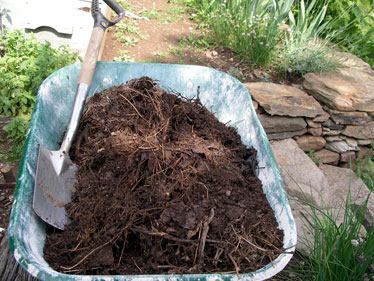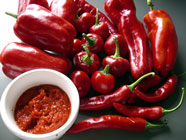Mulching is a simple technique of covering bare soil to; protect it from erosion and compression and to suppress weeds and retain moisture. Soil can be mulched with hard materials such as plastics or stone but better still are materials that are degradable because they also add nutrients, humus and improve the condition of the soil over time.
Best materials to mulch with
- Garden compost with a minimum depth of 2.5cm
- Wilted comfrey leaves excellent around solanum family and soft fruit. Layer 2 -3 leaves deep
- Dried grass clippings 5cm deep
- Weed free straw 10-15cm (6”) which settles to less
- Bracken chopped spread in layers 4-5 leaves deep
- Half rotted compost this is bulkier and good around large plants and to cover larger areas.
- Leaf mould, excellent soil enhancer brought down into the soil by worms
- Well rotted manure nutrient rich apply to greedy plants such as fruiting crops and corn.
Pine needles are not suitable for all crops but strawberries love a thick mulch of pine needles. Wild strawberries are forest plants and can often be found around pine forests so this is a good way to replicate their natural environment it also keeps the fruit clean and off the soil and deters slugs.
When to mulch
The golden rule of mulching is to mulch when the soil is in perfect condition, in most cases when the soil is warm and moist. Mulching will maintain the condition of the soil so do not mulch if the soil is too dry or cold and wet, mulch when the soil is warm after rains or the ground has been watered.
Mulch when planting out or soon afterwards. Mulches can also be applied:
Autumn mulch overwintering crops: celeriac, leeks, parsnip, kale, winter radishes to keep soil warm, preserve soil structure and reduce ground frost making it easier to lift roots in frosty weather.
Early spring mulch lightly with garden compost after digging unless the soil is very wet. It will keep the soil in good condition ready for sowing and planting later.
Late spring summer mulch between rows after seedlings have germinated and between growing crops such as peas, beans, onions and carrots.
Summer mulch summer fruiting crops with a thick layer of straw to keep moisture down in the soil suitable for tomatoes, aubergines, peppers, courgettes, also good for cucurbits and other sprawling plants to keep their fruit clean and of good quality.





#1 by Ulrich Wilder on April 26, 2013 - 23:34
Terrific work! That is the kind of info that should be shared around the web.
Shame on the search engines for now not positioning this publish higher!
#2 by successful pool party on March 26, 2014 - 22:14
Pretty great post. I just stumbled upon your weblog annd wanted to say thast I’ve truly enjoyed surfing around yur weblog posts.
In any case I will be subscribing for yoour rss fesed and I hope you write
again very soon!